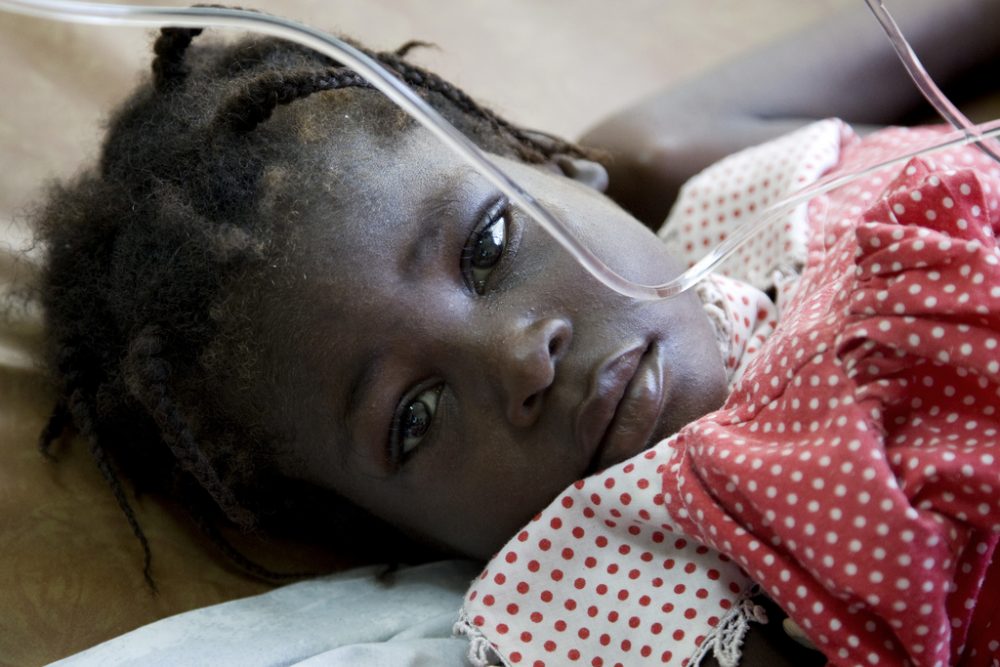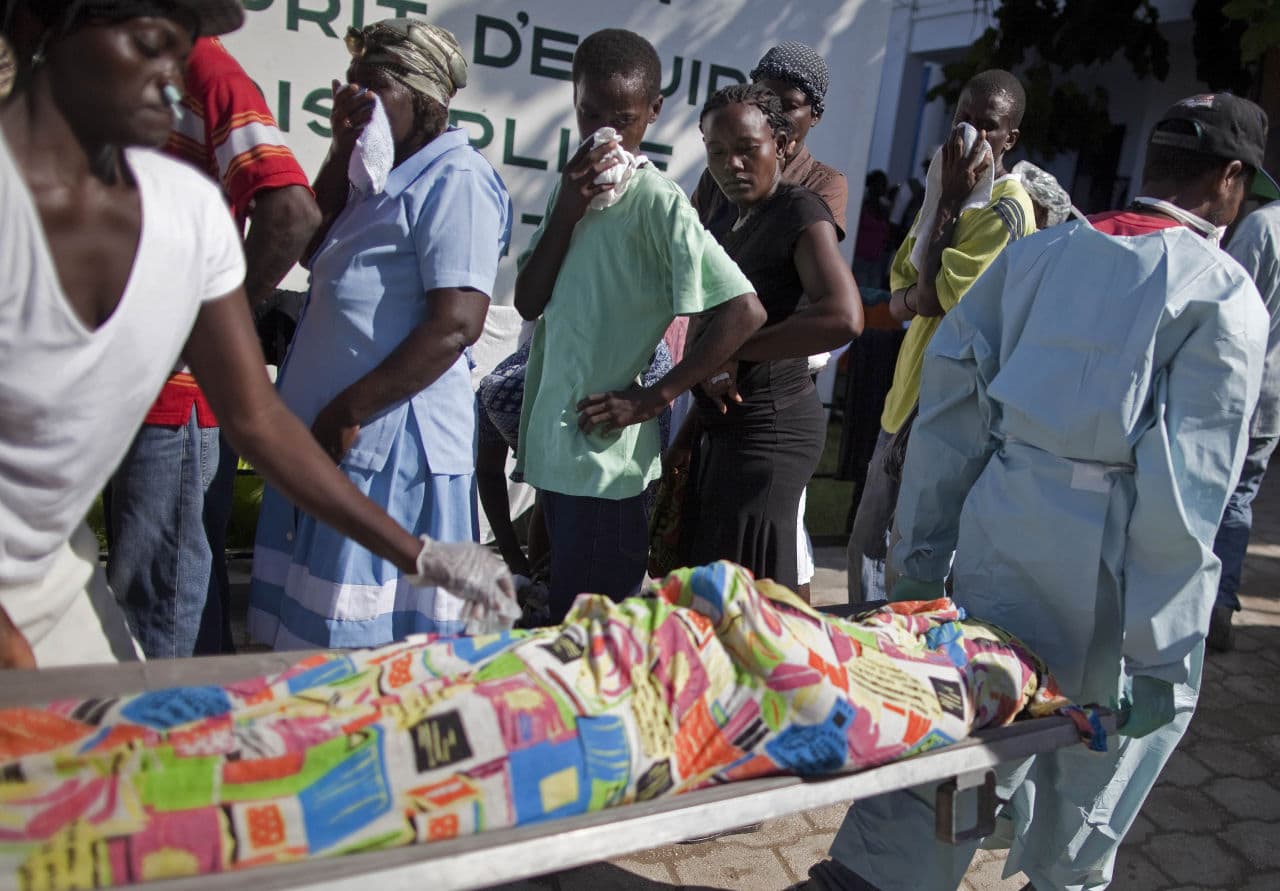Advertisement
A $1 Pill That Could Save Thousands Of Lives: Research Suggests Cheap Way To Avoid U.N.-Caused Cholera

By Richard Knox
Here's a way to get a big bang for a buck:
If a few hundred United Nations peacekeeping troops had taken a $1 antibiotic pill five years ago before they were deployed to Haiti, it may well have prevented a cholera outbreak that has so far sickened 753,000 Haitians and killed more than 9,000.
That’s the takeaway of a new study by Yale University researchers in the journal PLoS.
The authors believe their evidence should prompt the U.N. to adopt a simple and incredibly cost-effective strategy: Make sure all the 150,000 peacekeepers it sends out into the world each year from cholera-afflicted countries get preventive doses of antibiotics before deployment.
It's not the first time the U.N. has gotten that advice. It was first suggested by a panel of outside experts the agency appointed back in 2011 to investigate the Haitian epidemic. But so far the U.N. has rejected the panel's recommendation on preventive antibiotics.
It's not clear whether that will change. The U.N.'s chief medical officer, Dr. Jillian Farmer, said in an interview Friday that she welcomes the new study. But she noted it does not address "the biggest barrier to implementing the antibiotic recommendation" — a concern that what she calls "mass administration" of antibiotics would give rise to antibiotic-resistant strains of cholera.
"It may be we will be able to do this [administer pre-deployment antibiotics to U.N. peacekeepers]," Farmer said. "I don't have a closed mind."
The Yale researchers and others argue that the concern about generating resistant cholera strains is overblown because the antibiotics would be targeted — not administered massively. They further argue that the U.N. should sponsor research to answer that question, given the urgency of the question.
“When we have a case as extreme as Haiti showing the status quo doesn’t work, we should be working to build evidence for a solution that does, not using a lack of proven solutions as an excuse not to act,” said Adam Houston, who works with the Boston-based Institute for Justice and Democracy in Haiti.
The new study is the latest chapter in a tragic story that’s been unfolding since mid-October of 2010, when, researchers say, a single U.N. peacekeeper from Nepal most likely introduced cholera to Haiti, touching off the most explosive cholera epidemic in modern times. Before the outbreak. Haiti had been cholera-free for at least a century; thus, its citizens had no immunity to the disease.
"Based on DNA evidence, this outbreak was probably started by one or very few infected, asymptomatic individuals -- I would guess one,” said Daniele Lantagne, a Tufts University environmental engineer who was one of four independent experts appointed by the U.N. in 2011 to investigate the outbreak.
Since none of the 454 Nepalese peacekeeping troops deployed to Haiti in late 2010 showed any symptoms of cholera, all of them would have had to take a prophylactic dose of antibiotic to prevent any one of them from starting the outbreak. That would have cost around $500 — a tiny price to pay to avoid a devastating epidemic that — absent the investment of billions of dollars in clean water and sanitation — will continue into Haiti's indefinite future.
The new analysis finds that prophylactic antibiotics would have reduced the chances of the Haitian epidemic by 91 percent. When antibiotics are combined with cholera vaccination, the risk of an outbreak goes down by 98 percent.
The U.N. began requiring cholera vaccination of all its field personnel late last year. But the new study says vaccination by itself isn’t very effective; it reduces the risk of an outbreak by only 60 percent at best.
That’s because vaccination can prevent someone from falling ill from cholera, but it doesn’t prevent infection -- so a vaccinated person can still carry the cholera bacterium and pass it on to others.
“Vaccination alone is not enough,” said Virginia Pitzer, who led the Yale research team. “Vaccination plus antibiotic prophylaxis would be best.”
“Antibiotics are far and away the most effective and the least expensive,” added epidemiologist Joseph Lewnard, the study’s first author. “It hits the problem from two angles. It not only prevents those exposed to cholera from experiencing an infection, but if they do get infected it shortens the duration of shedding the bacteria. So once they arrive [at their deployment destination] they would no longer have bacteria in their stools.”
Lantagne says after she became aware of the new Yale study from this reporter, she polled the other three members of the earlier U.N.-appointed expert panel. “We all agree that we stand by our original recommendations and think this paper validates that,” Lantagne said.

In response to the 2011 report, U.N. Secretary-General Ban Ki-moon appointed an internal task force to consider this and other recommendations. That task force's work product has never been made public, but in 2014 the U.N. posted a summary of its recommendations on its website. That document, entitled a "fact sheet," said the task force had rejected the idea of preventive antibiotic treatment of peacekeepers.
The fact sheet said the panel concluded there was no evidence it would work and raised the fear that “mass treatment of…asymptomatic carriers” could lead to the rise of antibiotic-resistant cholera strains that would be hard to treat.
Implementing preventive antibiotics “without an evidence base is not ethical and should not be done,” the 2014 fact sheet said.
Outside researchers and human rights advocates believe the U.N. is wrong-headed about the risk of antibiotic resistance in this instance.
“I understand the concern about antibiotic resistance,” Lantagne said, “but there’s a difference between administering antibiotics to a large population and targeting them to a very small population that’s at high risk of transmission.”
Pitzer agrees. “At the scale [of antibiotic administration] we’re talking about, it’s not really large enough’’ to produce resistance, she said. “It’s a small drop in the bucket compared to all those taking antibiotics over-the-counter in many countries on a regular basis.”
The researchers and activists involved in the Haitian situation also complain about the secretive way the U.N. has dealt with recommendations to prevent future spread of cholera by U.N. personnel. The membership of the internal task force has never been disclosed, it met behind closed doors, and its report has never been released.
“The task force operated completely in the dark,” said Beatrice Lindstrom, a staff attorney for the Institute for Justice and Democracy in Haiti.
The U.N.’s Farmer, whose title is director of medical services, says she was not at the U.N. when the internal task force met, so doesn’t know why its report was never released in full. She said she would look into the possibility of releasing a separate report from an internal “expert group” that considered the use of prophylactic antibiotics. "It would make sense to me to release it,” she said.
Asked if the task force would reconvene to consider the new study, Farmer said: "That's not my decision. It was originally convened by the secretary-general. He will have to consider it."
Lantagne is not convinced there’s a need for more research in addition to the Yale paper and other evidence. “I think this is enough to act,” she said. “I would hope the U.N. committee is able to consider their recommendations in light of this new research and potentially revise them.”
The need to prevent future U.N.-caused cholera outbreaks is not limited to countries like Haiti where cholera is absent and the population is totally vulnerable. Even if a country already has cholera, an outbreak can be sparked by a new strain to which its population has no prior immunity, or only poor immunity.
“In Haiti, it was very easy to notice the arrival of cholera,” said Lewnard, of Yale. “Most places that receive U.N. peacekeepers have cholera transmission already, so a new strain is much less likely to be identified. So while [Haiti’s outbreak] was a rare event, it’s not reasonable to think it has happened before and could happen again.”
Meanwhile, a lawsuit against the U.N., brought by the Institute for Justice and Democracy in Haiti, drags on. The suit seeks to hold the U.N. accountable for introducing cholera to the nation and force it to pay for clean water and sanitation -- the only ways to eradicate the disease there.
A year ago a federal district court judge dismissed the lawsuit, which is now before a federal appeals court.
Cholera strikes up to 4.3 million people globally each year and kills as many as 142,000 people.